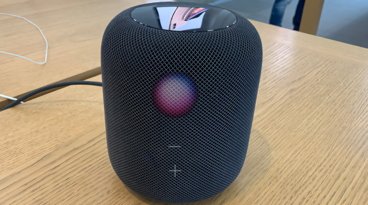Apple rumored to update MacBook Air with Intel's Sandy Bridge CPU in June
Citing an anonymous source, CNet reported on Friday that Apple plans to replace the Core 2 Duo chip found in the current MacBook Air, a processor that is two generations behind Intel's recently released Sandy Bridge processors. The MacBook Air was updated with a new, thinner design, flash memory drive, and an 11.6-inch model was added to the mix in an update released last fall.
In December, the same publication claimed that future MacBooks from Apple with Sandy Bridge processor would not use Nvidia graphics processors in at least some models 13 inches and under. It is rumored that the smaller models will switch to Sandy Bridge-only integrated graphics, while Apple's larger, higher-end MacBooks with screen sizes of 15 and 17 inches will allegedly rely on GPUs from AMD.
Intel began its roll-out of the Sandy Bridge next-generation processors in January, but the company quickly discovered an error in the chipset that accompanies the processor. That forced Intel to halt production of Sandy Bridge processors while it works on a fix for the 6 Series chipset code-named Cougar Point.
The error affected both desktop and mobile chips, leading to concerns that the issue could have an impact on Apple's anticipated MacBook Pro refresh. Apple last updated its MacBook Pro notebooks in April 2010, meaning an update for those products is likely to precede the alleged June refresh for the MacBook Air.
Intel announced this week that it has resumed shipment of chipsets for systems not affected by the Cougar Point design issue, which can lead to poor performance of devices connected to certain serial-ATA ports. The chipmaker also said that it will meet its deadline to begin shipping dual-core Sandy Bridge hips on their previously announced launch date of Feb. 20.
 Slash Lane
Slash Lane







 Amber Neely
Amber Neely
 Thomas Sibilly
Thomas Sibilly
 AppleInsider Staff
AppleInsider Staff
 William Gallagher
William Gallagher
 Malcolm Owen
Malcolm Owen
 Christine McKee
Christine McKee









74 Comments
Not buying it. It’s too soon to consider a MBA refresh and if they wanted to scrape OpenCL and a decent IGP for a better processor they would have done it with the refresh. They made the right choice.
Apple plans to update its recently redesigned MacBook Air line of thin-and-light notebooks with Apple's latest-generation Sandy Bridge processor in June, according to a new report.
Intel's right?
The Sandy Bridge chipset fiasco has really highlighted just how dependent so many HW manufacturers are on Intel now. I'm sure Apple hates this the same way they became overly-dependent on IBM/Motorola to crank out new versions of the PPC chips. It's always uncomfortable when a single component supplier can delay/derail your entire product roadmap.
I for one call monopolistic behavior on the part of Intel for muscling nVidia out of the chipset business. Someone please have the balls to file the antitrust lawsuit. Clearly this was a move to protect Intel's future plans for integrated graphics, given that nVidia's chipsets were in many ways superior to Intel's in terms of just speed and power, let alone the graphics portion. Intel still hasn't figured out graphics after all these years, now they're integrating it directly on-die to speed up communications with the GPU in order to mask its ridiculous flaws and shortcomings. How does a company with the engineering resources of Intel still treat graphics as an afterthought? Oh wait... I know, because the likes of Dell and HP, et al. will continue to use Intel graphics for their low-end budget crap, and consumers will continue buying them up in droves because they're cheap, and then buy another one when they can't play back their favorite videos or favorite games.
I for one call monopolistic behavior on the part of Intel for muscling nVidia out of the chipset business. Someone please have the balls to file the antitrust lawsuit.
Umm, I don't think that's how antitrust lawsuits work. It's not like 'calling dibs' or 'calling shotgun'.
I hope that ?
1. they bring back the ambient keyboard lighting.
2. they introduce the external battery status update from the macbook pro to the macbook air.